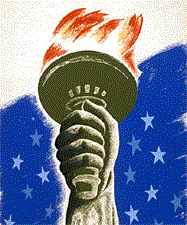Monday, September 25, 2006
State's Rights
This morning, in my email box, I received an interesting piece from North Dakota regarding a local bishop coming out and publicly condemning a death sentence being handed down in North Dakota. One great quote I'd like to share:
"Responding to this senseless act of violence with another act of violence through imposition of the death penalty does not erase the hurt caused by the first act," he [Bishop Samuel Aquila] contended. "Rather, it reinforces the false perspective of revenge as justice. In doing so, it diminishes respect for all human life, both the lives of the guilty and the innocent."
You can read the full article, "Bishop Opposes Death Sentence in North Dakota," here. It is worth the read and the bishop makes a number of terrific points.

A really knowledgable and observant person, when reading the title of the article, might have stopped and said, "Wait a minute! They don't have a death penalty in North Dakota!" and they'd be absolutely right (don't feel bad if this person wasn't you, it wasn't me either and this is my job). North Dakota's voters have decided, wisely, that they don't need the death penalty. So then how is Alfonso Rodriguez Jr. facing his execution in North Dakota? The answer . . . the federal death penalty!
The federal government has the right to prosecute people in federal trials and seek the death penalty even if they state in which the crime was committed does not impose the death penalty. Thus, the feds feel they have the right to step in and take the decision of whether or not to use the death penalty out of the hands of the citizens whose taxes pay for the system. The federal death penalty can even be applied for crimes that do not involve murder. And, of course, it should come as no surprise that the person being charged is a person of color. Federal death row demonstrates an even greater racial bias in sentencing than other death rows across the country. It seems to me that if the people of a state have made the choice to reject capital punishment as a public policy tool, the federal government should respect that choice and not override the democratic process.
You can learn more about the federal death penalty here.
"Responding to this senseless act of violence with another act of violence through imposition of the death penalty does not erase the hurt caused by the first act," he [Bishop Samuel Aquila] contended. "Rather, it reinforces the false perspective of revenge as justice. In doing so, it diminishes respect for all human life, both the lives of the guilty and the innocent."
You can read the full article, "Bishop Opposes Death Sentence in North Dakota," here. It is worth the read and the bishop makes a number of terrific points.

A really knowledgable and observant person, when reading the title of the article, might have stopped and said, "Wait a minute! They don't have a death penalty in North Dakota!" and they'd be absolutely right (don't feel bad if this person wasn't you, it wasn't me either and this is my job). North Dakota's voters have decided, wisely, that they don't need the death penalty. So then how is Alfonso Rodriguez Jr. facing his execution in North Dakota? The answer . . . the federal death penalty!
The federal government has the right to prosecute people in federal trials and seek the death penalty even if they state in which the crime was committed does not impose the death penalty. Thus, the feds feel they have the right to step in and take the decision of whether or not to use the death penalty out of the hands of the citizens whose taxes pay for the system. The federal death penalty can even be applied for crimes that do not involve murder. And, of course, it should come as no surprise that the person being charged is a person of color. Federal death row demonstrates an even greater racial bias in sentencing than other death rows across the country. It seems to me that if the people of a state have made the choice to reject capital punishment as a public policy tool, the federal government should respect that choice and not override the democratic process.
You can learn more about the federal death penalty here.


